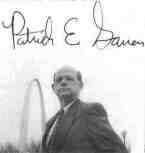
A VIEW FROM METRO EAST
Patrick E. Gauen writes an Illinois column for the St. Louis Post-Dispatch.

State Supreme Court justice's stand makes his colleagues bristle
by Patrick E. Gauen
The last time Moses W. Harrison II made statewide news, he was accused of being too chummy with fellow justices of the Illinois Supreme Court because he acted as a voice for restraint in punishing the transgressions of then-Chief Justice James Heiple.
Harrison, the southern Illinois member of the court, led the tribunal that censured Heiple in 1997 for rubbing his authority in the noses of traffic cops who had the audacity to pull him over. Some critics wanted Heiple's hide; Harrison gave them some flakes of Heiple's dander.
But nobody's calling Harrison "chummy" now, not since he rubbed his independence in the noses of Heiple and the other five justices on the question of continuing executions. They exchanged nasty barbs over a case that left some observers wondering just what lit a fire under Harrison's bench.
Accessible and unfailingly polite, Harrison readily gives audience to the question, but no voice to an answer. Judges explain themselves formally, he explains, but do not amplify informally. Amplified or not, his formal opinion came across loud and clear: The state is more concerned with haste than care in capital punishment. "The result, inevitably, will be that innocent persons are going to be sentenced to death and executed in Illinois," he wrote.
|
Moses Harrison's dissent on the death penalty makes some wonder what lit a fire under his bench. |
His words were the dissent in a 6-1 decision, and a dissent that — calculated or not — stacked his colleagues squarely opposite a growing concern about an Illinois death row that is being emptied as often by exoneration as by execution. They bristled.
"Justice Harrison frequently chooses, as he does in this case, to impugn the integrity of other members of the court and to impute improper motives to those with whom he disagrees," replied Justice Benjamin Miller. "When rancor eclipses reason, the quality of the debate is diminished, the bonds of collegiality are strained, and the judicial process is demeaned."
Justice Charles E. Freeman warned Harrison to be "careful not to elevate personal beliefs above thoughtful constitutional analysis."
What Harrison will say about the case is that he did exactly as Freeman preached. "My decisions are based on the law and not my personal beliefs, because they're really irrelevant," he told me.
Harrison has upheld the death penalty in other cases, but broke ranks in the appeal of Donald Bull because he said it raised a new issue of whether the system is so flawed that the execution of someone innocent is inevitable. Bull is a brain-damaged man sentenced to die for killing a woman and her toddler son in Canton in 1993, then burning the bodies.
Harrison complained that lawmakers and judges "appear to have abandoned any genuine concern with insuring fairness and reliability of the system. Achieving 'finality' in death cases, and doing so as expeditiously as possible, have become the dominant goals in death penalty jurisprudence."
Noting that outsiders rather than internal safeguards were responsible for proving condemned men innocent, Harrison wrote in words tinged with sarcasm, "They survived despite the criminal justice system, not because of it."
Harrison, 67, who grew up the son of a dentist and grandson of a doctor in Collinsville, never handled a capital case as a private lawyer, and never heard one in nine years as a Madison County judge.
He said his family was never the victim of a violent crime, although he did see a law partner almost killed outside their office in a 1972 car bombing that remains unsolved.
Harrison is a Democrat who ran for the state Supreme Court in 1992 on a platform of competence and integrity, and refused to be baited into a debate with his Republican opponent, Don W. Weber, who campaigned as a pro-death penalty candidate.
If religion is a factor, Harrison won't say it. He is a practicing Episcopalian, the son of a Roman Catholic mother and Episcopal father. Both denominations oppose executions.
No matter the motivation, Harrison has staked out a position too bold to abandon now, using words that stick. "It is no answer to say we are doing the best we can," he wrote in the Bull dissent. "If this is the best our state can do, we have no business sending people to their deaths. "
Illinois Issues September 1999 45